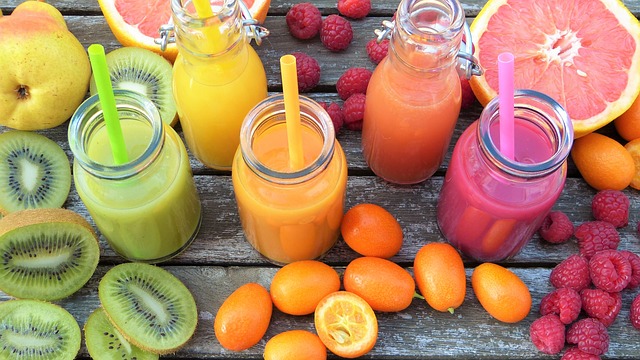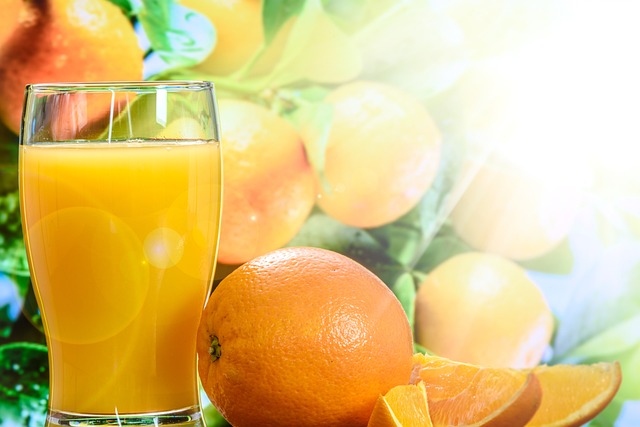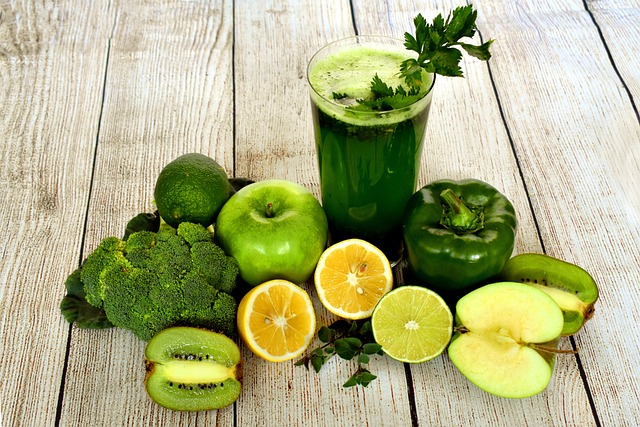Juices are made by extracting the liquid from fruits or vegetables, while smoothies blend whole fruits or vegetables along with other ingredients like yogurt or milk.
TL;DR Juice Vs. Smoothie
While both juices and smoothies offer numerous health benefits, they have distinct advantages. Juices provide a concentrated dose of vitamins, minerals, and antioxidants without the fiber content. On the other hand, smoothies retain all the fibers from fruits and vegetables, promoting digestion and providing a feeling of fullness.
When choosing between juice or a smoothie, consider your personal preferences and dietary needs. If you’re looking for a quick burst of nutrients without the fiber content, then juice might be your go-to option. However, if you want to enjoy a refreshing drink that keeps you fuller for longer while also benefiting from all the fiber goodness nature has to offer – opt for a deliciously blended smoothie.
What is a Smoothie?

A smoothie is a delightful concoction made by blending together various fruits, vegetables, and other ingredients like yogurt or milk. Unlike juice, which extracts the liquid from fruits and vegetables, a smoothie includes the whole food itself. This means that when you sip on a smoothie, you’re benefiting from both the fiber and nutrients contained within.
Smoothies offer endless possibilities for flavor combinations. From classic strawberry-banana to exotic tropical blends, there’s something to suit every taste bud. Plus, you can customize your smoothie with additional add-ins like protein powder or superfood supplements for an extra nutritional boost.
One of the best things about smoothies is their versatility. They can be enjoyed as a quick breakfast option on busy mornings or as a post-workout refuel. With their thick consistency and creamy texture, they make for satisfying snacks that keep hunger at bay.
In addition to being deliciously refreshing, smoothies are also an excellent way to pack in essential vitamins and minerals. The combination of fresh produce provides your body with antioxidants that support overall health and well-being.
What is a Juice?

Juice is the liquid extracted from fruits or vegetables through squeezing or pressing. It’s essentially the essence of these natural wonders packed into a convenient and delicious form.
The process of making juice involves removing the solid parts of the fruit or vegetable to extract only the liquid content. This means that when you sip on your favorite juice, you’re getting all the vitamins, minerals, and antioxidants without any fiber.
One thing worth noting is that not all juices are created equal. While some are made solely from fruits like oranges or apples, others incorporate vegetables such as spinach or carrots for added nutritional benefits. Additionally, some juices may be sweetened with added sugars while others contain no additional sweeteners at all.
Juice Vs. Smoothie – Key differences
| Aspect | Juice | Smoothie |
|---|---|---|
| Preparation | Extracted liquid from fruits or vegetables by pressing or blending, often removing the fiber | Blended mixture of whole fruits, vegetables, yogurt, or other ingredients, including fiber |
| Consistency | Liquid and transparent, without the pulp or fiber | Thicker, with a pulpy or creamy texture due to the inclusion of whole ingredients |
| Fiber Content | Lower fiber content as it's often removed during juicing | Higher fiber content as it includes the whole fruit or vegetable |
| Nutrient Retention | May lose some heat-sensitive nutrients due to juicing process | Retains more nutrients, including fiber, from the whole ingredients |
| Sugar Concentration | Can be high in natural sugars, especially if made from fruits | Generally lower in sugar due to the fiber content and whole ingredients |
| Fillingness | Less filling due to the lack of fiber, which can lead to quicker digestion | More filling due to the fiber, protein, and other whole ingredients |
| Processing Time | Faster to prepare, as it typically involves juicing only | Slightly longer preparation due to blending whole ingredients |
| Customization | Limited to the juice of fruits or vegetables | Highly customizable with various ingredients like fruits, vegetables, yogurt, and more |
| Health Benefits | Concentrates nutrients, but may lack the benefits of fiber | Provides nutrients and fiber, promoting a feeling of fullness and improved digestion |
The Benefits of Drinking Smoothies and Juices
Benefits of Drinking Smoothies
Nutrient Retention: Smoothies retain more nutrients compared to juices because they typically include whole fruits, vegetables, and other ingredients. This means you get the vitamins, minerals, and fiber present in the entire food.
Fiber: The fiber in smoothies promotes digestion and can help manage blood sugar levels. It also contributes to a feeling of fullness, making smoothies a satisfying snack or meal replacement.
Customization: You can customize smoothies with various ingredients like fruits, vegetables, yogurt, nuts, seeds, and even protein powder, allowing you to tailor them to your nutritional needs and taste preferences.
Hydration: Smoothies can be a great way to stay hydrated, especially when using ingredients like water-rich fruits and vegetables or adding yogurt or milk.
Energy: The natural sugars and carbohydrates in smoothies provide a quick source of energy, making them a good choice for pre- or post-workout snacks.
Weight Management: When used as meal replacements or snacks, smoothies can help with weight management by providing essential nutrients in a controlled portion.
Benefits of Drinking Juices
Nutrient Concentration: Juices concentrate the nutrients found in fruits and vegetables, providing a quick and efficient way to consume vitamins, minerals, and antioxidants.
Digestive Rest: Because the fiber is removed during juicing, the digestive system has less work to do. This can be beneficial for individuals with sensitive digestive systems or those seeking a rest from fiber intake.
Hydration: Like smoothies, juices can contribute to hydration, especially when made from water-rich fruits and vegetables.
Detoxification: Some people believe that certain juices can aid in detoxifying the body, although scientific evidence supporting detox claims is limited.
Variety: Juices allow you to enjoy the flavors of a wide variety of fruits and vegetables in a concentrated form.
Digestive Health: Juices can be easier on the stomach for individuals with certain digestive issues, as they lack the fiber that can sometimes be hard to digest.
It’s important to note that while both smoothies and juices have their benefits, they are not a substitute for a well-rounded diet that includes a variety of whole foods.
The choice between smoothies and juices should align with your nutritional goals and dietary preferences. Additionally, it’s essential to be mindful of sugar content in both smoothies and juices, especially when using high-sugar fruits.
Image Credits
Featured Image By – Marijana from Pixabay
Image 1 By – Silvia from Pixabay
Image 2 By – Photo Mix from Pixabay








